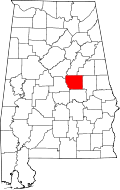Marble Valley, Alabama | |
|---|---|
| Coordinates: 33°02′38″N86°27′07″W / 33.04389°N 86.45194°W | |
| Country | United States |
| State | Alabama |
| County | Coosa |
| Elevation | 518 ft (158 m) |
| Time zone | UTC-6 (Central (CST)) |
| • Summer (DST) | UTC-5 (CDT) |
| Area codes | 256 & 938, 334 |
| GNIS feature ID | 156656 [1] |
Marble Valley is an unincorporated community in Coosa County, Alabama, United States.


